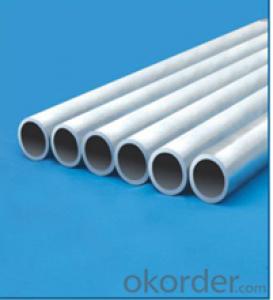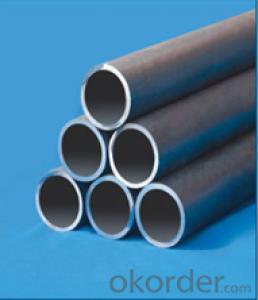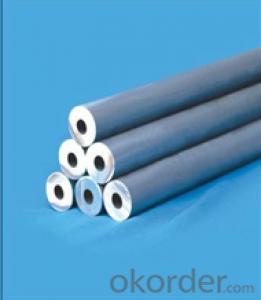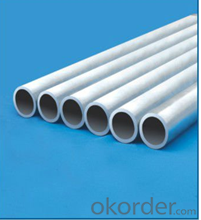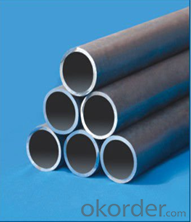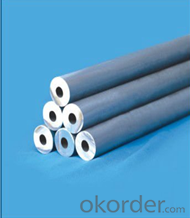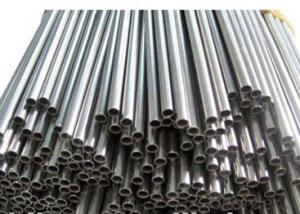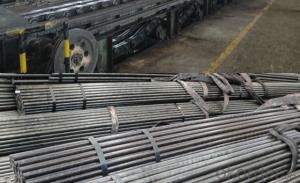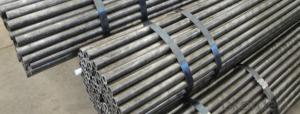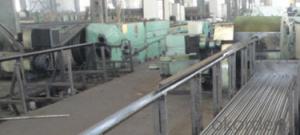Seamless HARD Carbon Steel Pipe&Tube For Tunnel And Anchor Rod 20# CNBM
- Loading Port:
- Qingdao
- Payment Terms:
- TT OR LC
- Min Order Qty:
- 10 pc
- Supply Capability:
- 30 pc/month
OKorder Service Pledge
OKorder Financial Service
You Might Also Like
Quick Details
| Thickness: | 1 - 14 mm | Section Shape: | Round | Outer Diameter: | 8 - 80 mm |
| Place of Origin: | HEB,HEB,HEB,China,FORM A,FORM E China (Mainland) Ch China (Mainland) | Secondary Or Not: | Non-secondary | Application: | Hydraulic Pipe |
| Technique: | Cold Rolled | Certification: | ISO9001:2008 | Surface Treatment: | oil |
| Special Pipe: | Thick Wall Pipe | Alloy Or Not: | Is Alloy | length: | 5-8m |
| usage3: | machine bush parts | usage4: | machine and engine pin | usage5: | tunnel and anchor rod |
| Test: | eddy current test,Ultrasonic Testing | usage2: | shock absorption bush | usage1: | power transmission machinery |
| colour: | black | name: | large-diameter hot-expanding seamless steel pipe | Grade: | 10#,20#,45#,16Mn,16Mo,16mo3,Q345,ST35,St37,ST37.4,St52,10#-45#,Mo,Q195-Q345,ST35-ST52 |
| Standard: | ANSI A210-1996,ASTM A1020-2002,ASTM A213-2001,ASTM A403-2007,ASTM A789-2001,BS 1387,BS EN10296,DIN 17175,DIN EN 10025,DIN EN 10217-1-2005,GB/T8162,GB/T8163,JIS G3459-2004,JIS G3461-2005,ASTM,BS,DIN,GB,JIS |
Packaging & Delivery
| Packaging Detail: | Marking: as per customer's requests. Painting varnish coating on the pipe. steel trips, woven bag |
| Delivery Detail: | 10-45 days or as the customer's request |
Seamless Carbon Hard Steel Pipe&Tube For Tunnel And Anchor Rod
Type | Manufacture & Sales OEM | |
Process | Seamless, Cold drawn and Cold rolled, finish-rolled | |
Material | 20#, 10#, 45#, 35# , Q345, 16Mn, 42CrMo | |
size | Outer Diameter | 8 –80mm |
Wall Thickness | 1-14mm | |
Length | 5-10m | |
Standard
| DIN st42, st45, st35, st37 and st52, GB 8162 | |
Package | 1. Bundle packing. 2. Bevelled end or plain end or warnished as per buyer's requestments. 3. Marking: as per customer's requests. 4. Painting varnish coating on the pipe. 5. Plastic caps at ends. | |
Delivery Time | 15to20 days or as clients reqestments | |
- Q: How do you inspect steel pipes for defects?
- The inspection of steel pipes for defects requires a methodical approach that combines visual examination, non-destructive testing (NDT) techniques, and specialized equipment. The following are the typical steps undertaken to inspect steel pipes for defects: 1. Visual Examination: Commence by visually inspecting the external surface of the pipe, searching for any visible indications of defects, including cracks, dents, or corrosion. Particular attention should be given to welds, joints, and areas prone to stress or damage. 2. Ultrasonic Testing (UT): Ultrasonic testing is commonly employed to identify internal defects in steel pipes. This technique involves transmitting ultrasonic waves into the pipe and then interpreting the echoes received. Any irregularities in the internal structure, such as cracks or voids, can be identified and analyzed. 3. Magnetic Particle Inspection (MPI): MPI is a widely utilized technique for detecting defects on or near the surface, such as cracks, seams, or other discontinuities. This method involves applying a magnetic field to the pipe and subsequently applying ferromagnetic particles (usually iron-based) to the surface. These particles accumulate and form visible indications at areas where magnetic flux leakage is caused by defects. 4. Eddy Current Testing (ECT): Eddy current testing is suitable for detecting surface and near-surface defects in conductive materials like steel. This technique involves inducing an alternating current into the pipe and monitoring changes in the electrical currents induced by any present defects. These changes are then analyzed to identify and evaluate the defects. 5. Radiographic Testing (RT): Radiographic testing is conducted by exposing the steel pipe to X-rays or gamma rays and capturing radiographic images of the pipe. This technique allows for the detection of internal defects, such as cracks, porosity, inclusions, or variations in wall thickness. The radiographic images are subsequently examined for any indications of defects. 6. Dye Penetrant Inspection (DPI): DPI is a method used to identify defects on the surface of steel pipes. It involves applying a liquid dye to the surface, which penetrates into any surface cracks or flaws. After sufficient time for the dye to seep in and react, excess dye is removed, and a developer is applied to draw out the dye from the defects, rendering them visible. 7. Pressure Testing: Pressure testing entails pressurizing the steel pipe to a predetermined level and monitoring for any pressure drops or leaks. This test ensures that the pipe can withstand the required pressure without any structural defects. It is worth noting that the choice of inspection technique depends on various factors, such as the type of defect being sought, the size and characteristics of the pipe, and the specific industry standards and regulations. Inspection professionals with expertise in NDT methods and equipment are typically employed to ensure precise and dependable results.
- Q: What is the difference between API 5L and ASTM A53 steel pipes?
- API 5L and ASTM A53 steel pipes differ mainly in their specifications and intended applications. API 5L is a standard for seamless and welded steel pipes used for transportation of oil, gas, and water in the petroleum and natural gas industries. It specifies requirements for the manufacture of two product specification levels (PSL1 and PSL2) of seamless and welded steel pipes. On the other hand, ASTM A53 is a standard specification for seamless and welded black and hot-dipped galvanized steel pipes used for mechanical and pressure applications. While both standards have similarities, they have different scopes and requirements, making them suitable for distinct purposes in different industries.
- Q: Does seamless steel tube have a bend of 135 degrees?
- In engineering, it is usually marked as "45 elbow" and has no "135" mark. The angle of the elbow is acute, so there will be no more than 90 degrees elbow.
- Q: How to calculate the maximum bending stress of steel pipe? Is there a list of the maximum flexural normal stresses for steel pipes of different materials and diameters?
- Wnx - net sectional modulus of steel tubes, also called net sectional resistance moment. If the section is not weakened, it can be found in the steel sheet of the steel structure design manual. If the section is weakened, it can be calculated by the formula according to the sectional dimension according to the formula of the material mechanics.
- Q: ASME seamless tube how to express, what is the form, I did not find on the ASME, thank God!
- You can refer to the ASME B31.10, such as the requirements for the SA106GRB seamless steel tube outer diameter of 168.3 x 7.11, specifications can be marked as NPS6 SCH40 SMLS, the real mark should include pressure steel pipe factory name or trademark, and the material level, specifications, standards, wall number, batch number, pressure test (if any), NDE detection (if any)
- Q: How are steel pipes used in the manufacturing of heat exchangers?
- Steel pipes are commonly used in the manufacturing of heat exchangers due to their high strength and durability. They serve as the primary components for carrying hot or cold fluids within the heat exchanger system. The steel pipes facilitate the efficient transfer of heat between the two fluids by offering excellent thermal conductivity. Additionally, the corrosion-resistant properties of steel ensure the longevity and reliability of the heat exchanger, making it suitable for various industrial applications.
- Q: Can steel pipes be used for steam distribution?
- Yes, steel pipes can be used for steam distribution. Steel pipes are commonly used for conveying steam due to their high heat resistance and durability. They can withstand the high temperatures and pressures associated with steam distribution, making them a suitable choice for this application.
- Q: How are steel pipes tested for leakage?
- Steel pipes are tested for leakage using various methods, including hydrostatic testing, pneumatic testing, and ultrasonic testing. Hydrostatic testing involves filling the pipe with water or another liquid and subjecting it to high pressure to check for any leaks. Pneumatic testing, on the other hand, involves pressurizing the pipe with air or gas to detect any leakage. Ultrasonic testing utilizes sound waves to identify any defects or leaks in the pipe by measuring the time it takes for the sound waves to bounce back. These testing methods ensure that steel pipes meet the required standards and are free from any leakage.
- Q: What does cathodic protection of steel tubes mean?
- The corrosion of metals causes great economic losses directly or indirectly. Foreign statistics show that every year due to corrosion and scrap metal materials, equivalent to 20~40% of metal production, the world every year due to corrosion and loss of metal reached more than 1 tons.
- Q: What are the different methods of insulating steel pipes?
- There are several different methods of insulating steel pipes, depending on the specific needs and requirements of the application. Some of the common methods include: 1. Insulation wraps: This method involves wrapping the steel pipes with insulating materials such as fiberglass, mineral wool, or foam insulation. The insulation is then secured with adhesive or tape to ensure a tight and secure fit. Insulation wraps are cost-effective and relatively easy to install, making them a popular choice for many applications. 2. Insulation coatings: This method involves applying a layer of insulating material directly onto the surface of the steel pipe. The coating can be made from materials such as epoxy, polyurethane, or polyethylene. Insulation coatings are ideal for situations where the pipes are exposed to harsh environments, as they provide a protective barrier against corrosion and temperature fluctuations. 3. Insulation jackets: This method involves using pre-fabricated insulation jackets that are designed to fit over the steel pipes. These jackets are typically made from a combination of insulation materials and a weatherproof outer layer. Insulation jackets are commonly used for outdoor or exposed pipelines, as they provide excellent insulation and protection against external elements. 4. Insulation foam: This method involves injecting foam insulation into the cavity between the steel pipe and an outer casing. The foam expands and hardens, creating a sealed and insulated layer around the pipe. Foam insulation is highly effective in preventing heat loss or gain, and it also provides excellent soundproofing properties. 5. Insulation tapes: This method involves using specialized insulation tapes that are wrapped around the steel pipes. These tapes are typically made from materials such as PVC or rubber, which have good insulating properties. Insulation tapes are often used for smaller pipes or joints, as they provide a flexible and easy-to-apply solution. It is important to consider factors such as the operating temperature, environmental conditions, and specific requirements of the application when choosing the appropriate method of insulating steel pipes. Consulting with a professional or insulation specialist can help in determining the most suitable insulation method for your specific needs.
Send your message to us
Seamless HARD Carbon Steel Pipe&Tube For Tunnel And Anchor Rod 20# CNBM
- Loading Port:
- Qingdao
- Payment Terms:
- TT OR LC
- Min Order Qty:
- 10 pc
- Supply Capability:
- 30 pc/month
OKorder Service Pledge
OKorder Financial Service
Similar products
Hot products
Hot Searches
Related keywords
